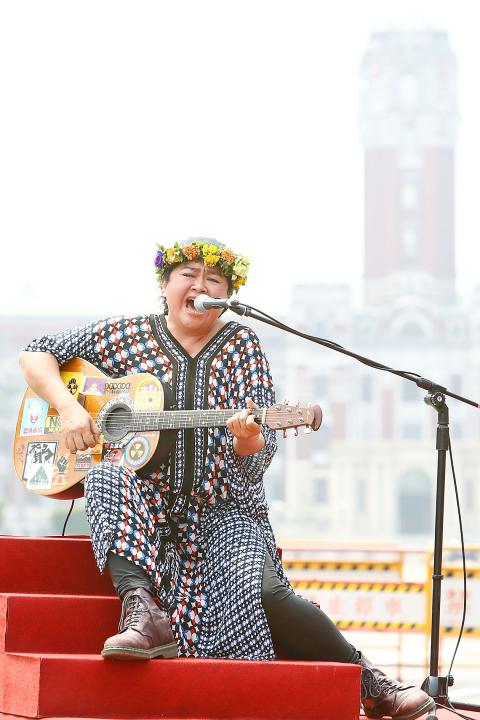Aboriginal rights campaigner Panai Kusui and other advocates yesterday relocated dozens of potted lilies from their protest site at the 228 Peace Memorial Park to an art museum as the Taipei City Government prepares to demolish their camp next week.
After the government announced the Guidelines for Demarcating Aboriginal Land or Tribal Areas (原住民族土地或部落範圍土地劃設辦法) in February 2017, Panai and other advocates camped on Ketagalan Boulevard, in front of the Presidential Office Building, in protest and were later forced to move to the nearby park.
The guidelines restrict Aboriginal domains to government-owned plots and exclude areas owned by private landowners, enabling businesses to launch controversial development projects on Aboriginal land, such as the Miramar Resort Hotel (美麗灣渡假村) project, advocate Liao Hsing-yu (廖幸渝) said yesterday.

Photo: Chen Yi-kuan, Taipei Times
Under the slogan “No one is an outsider,” the campaigners yesterday had camped in the area for 696 days, Liao said.
However, the municipality has said that it would remove their belongings on Tuesday, she said.
The government might have timed the removal to take advantage of the absence of other key campaigners, such as filmmaker Mayaw Biho and singer Nabu Husungan Istanda, who have left for other events, she added.
RELOCATION
The activists yesterday invited members of the public to help them relocate some of the nearly 300 pots of Taiwanese indigenous lily sprouts to the Taipei Fine Arts Museum, where they have an exhibition area at the Taipei Biennial, which this year is titled Post-Nature — A Museum as an Ecosystem and ends on March 10.
Lilies are a sacred symbol for the Rukai people and campaigners from different Aboriginal communities have expressed the hope that they could return home by the time the plants blossom.
VITALITY
Taiwanese indigenous lilies are full of vitality and people who care for them should not rush to weed their pots, Panai said, before transporting some of the lilies by MRT along with nearly 20 participants.
The Democratic Progressive Party government has defended Taiwanese dignity in the face of Chinese pressure, yet it is insensitive toward the pain of Aborigines, who were deprived of their ancestral lands, languages and cultures, she said in a previous TV interview.
She added that she would continue to fight for Aborigines’ rights and raise public awareness about their predicament.

ANOTHER EMERGES: The CWA yesterday said this year’s fourth storm of the typhoon season had formed in the South China Sea, but was not expected to affect Taiwan Tropical Storm Gaemi has intensified slightly as it heads toward Taiwan, where it is expected to affect the country in the coming days, the Central Weather Administration (CWA) said yesterday. As of 8am yesterday, the 120km-radius storm was 800km southeast of Oluanpi (鵝鑾鼻), Taiwan’s southernmost tip, moving at 9kph northwest, the agency said. A sea warning for Gaemi could be issued tonight at the earliest, it said, adding that the storm is projected to be closest to Taiwan on Wednesday or Thursday. Gaemi’s potential effect on Taiwan remains unclear, as that would depend on its direction, radius and intensity, forecasters said. Former Weather Forecast

As COVID-19 cases in Japan have been increasing for 10 consecutive weeks, people should get vaccinated before visiting the nation, the Centers for Disease Control (CDC) said. The centers reported 773 hospitalizations and 124 deaths related to COVID-19 in Taiwan last week. CDC Epidemic Intelligence Center Director Guo Hung-wei (郭宏偉) on Tuesday said the number of weekly COVID-19 cases reported in Japan has been increasing since mid-May and surpassed 55,000 cases from July 8 to July 14. The average number of COVID-19 patients at Japan’s healthcare facilities that week was also 1.39 times that of the week before and KP.3 is the dominant

The Chinese Communist Party’s (CCP) working group for Taiwan-related policies is likely to be upgraded to a committee-level body, a report commissioned by the Mainland Affairs Council (MAC) said. As Chinese President Xi Jinping (習近平) is increasingly likely to upgrade the CCP’s Central Leading Group for Taiwan Affairs, Taiwanese authorities should prepare by researching Xi and the CCP, the report said. At the third plenary session of the 20th Central Committee of the CCP, which ended on Thursday last week, the party set a target of 2029 for the completion of some tasks, meaning that Xi is likely preparing to

US-CHINA TRADE DISPUTE: Despite Beijing’s offer of preferential treatment, the lure of China has dimmed as Taiwanese and international investors move out Japan and the US have become the favored destinations for Taiwanese graduates as China’s attraction has waned over the years, the Ministry of Labor said. According to the ministry’s latest income and employment advisory published this month, 3,215 Taiwanese university graduates from the class of 2020 went to Japan, surpassing for the first time the 2,881 graduates who went to China. A total of 2,300 graduates from the class of 2021 went to the US, compared with the 2,262 who went to China, the document showed. The trend continued for the class of 2023, of whom 1,460 went to Japan, 1,334 went to